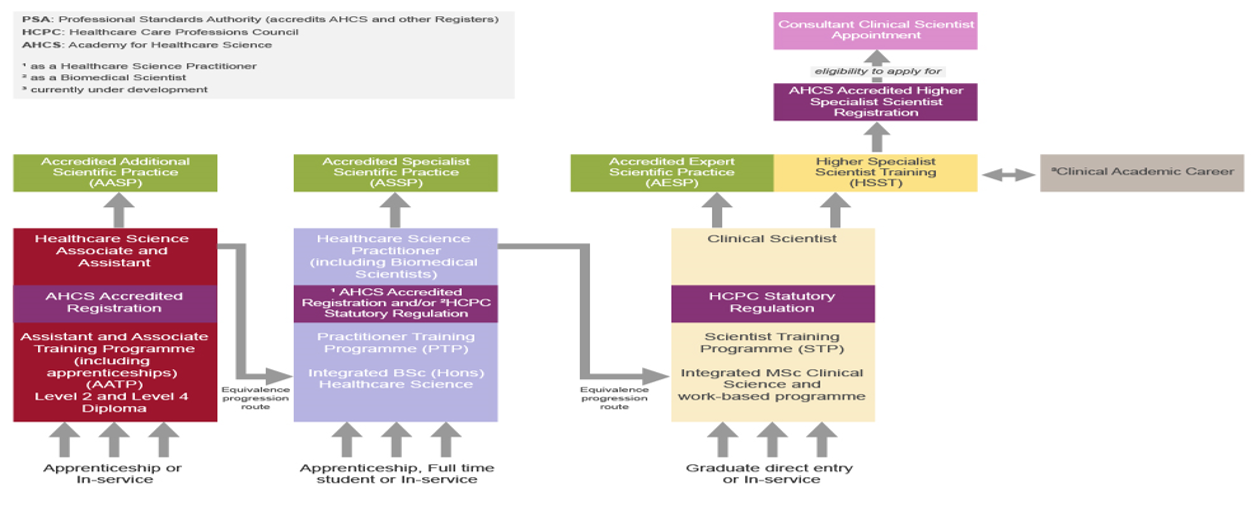There are around 50,000 Healthcare Scientists working within the NHS and public health services – around 5% of the workforce, and they are involved in around 80% of all patient diagnoses and pathways, working with and developing leading edge technology. Together they provide the scientific backbone of the NHS. Healthcare Scientists are a very diverse group – the National School of Healthcare (NSHCS), as part of Health Education England, delivers programmes to more than 34 different specialties, grouped within 4 general themes – Life Sciences (eg. Haematology, Microbiology, Biochemistry), Physical Sciences (including Clinical Engineering and Medical Physics), Physiological Sciences (eg. Cardiac Science, Audiology and Critical Care Science) and Bioinformatics (including Health Informatics, Genomics and Physical Sciences). Some roles are very patient facing, others are more laboratory or equipment based, but all roles share a common purpose in improving patient care through prevention, diagnosis and treatment of a wide range of medical conditions. Research into new treatments and technology mean that the way we deliver healthcare is continually changing. Advances in genomics (led by Healthcare Scientists), allow us to look at the patient as a whole rather than looking at a particular diagnosis, providing much richer information about the complex interactions within a person and with their environment, leading to more accurate treatment. Artificial Intelligence is already being employed to help with some of the more time consuming tasks in diagnostics, in a safe and accurate way, to free up scientist time to keep on developing and improving services - research has recently been published looking at machine learning in interpretation of Echo images1.

Fig 1. Career and training pathways for HCS workforce
Healthcare scientists are employed at many grades within the NHS, from Healthcare Science Associates and Assistants to Consultant Clinical Scientists (Fig 1). The NSHCS works in partnership with Universities, training departments, commissioners and professional bodies to ensure the provision and quality of various training programmes and End point Assessments which support entry and progression within the career framework. These include the Practitioner Training Programme – an undergraduate degree which includes workbased placements, leading to voluntary registration as a Healthcare Science Practitioner, and the Scientist Training Programme - a 3 year full time programme which integrates an M. Sc. in Healthcare Science with workbased placements allowing trainees to gain the knowledge, skills and experience to obtain Statutory Regulation as a Clinical Scientist. The HSST programme is a 5 year bespoke programme designed to develop the skills necessary to become Consultant Clinical Scientists.
The STP recruits nationally, and places (commissioned by departments) are offered as either Direct Entry (open to all) or In-service, where departments have already identified a current employee who they wish to support through the programme. This year’s commissions include 31 Direct entry and 22 Inservice posts in Cardiac Science – trainees complete a number of common modules and then specialize in either Echo or Cardiac Rhythm management in their final year.
There are workforce challenges within many areas of Healthcare Science and significant evidence of a particular shortage of Echocardiographers. My role within the School includes developing new training pathways to support recruitment into the career structure, flexibility of progression and appropriate training to deliver the skills to match workforce needs. As I have a background in Echo and work closely with the BSE, Echo is high on this Agenda. This year will see the pilot of an HEE-funded integrated postgraduate Echo course, which aims to fast track trainees to BSE Accreditation in TTE, and the intention is to expand this initiative and others within Healthcare Science, including the training programmes already in place, to ensure we continue to recruit, train and support such a hugely diverse and highly skilled workforce. Other current initiatives within the School are focussing on Clinical Academic careers, including creating networks to help support Scientists working in this area, and digital programmes including the Topol Fellowship.
Find out more
References
- Ghorbani, A., Ouyang, D., Abid, A. et al. Deep learning interpretation of echocardiograms. npj Digit. Med. 3, 10 (2020)